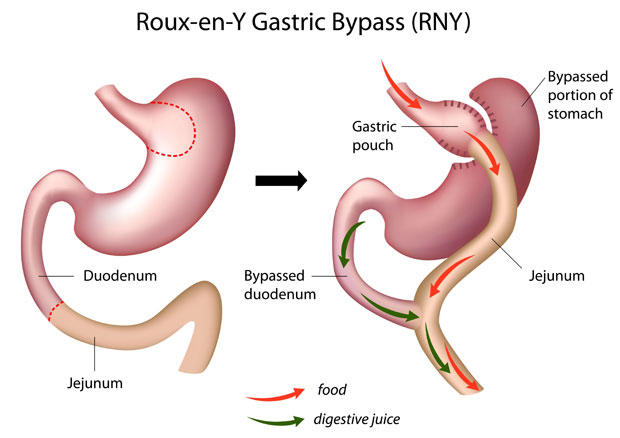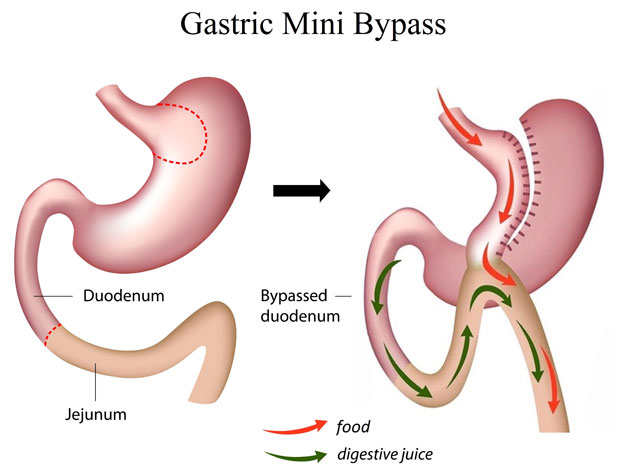Treatments – Bariatric Surgery
Laparoscopic Gastric Bypass
There are two types of gastric bypass. A mini-gastric bypass and the full gastric bypass. These are surgical procedures performed under general anaesthesia. They are usually performed in patients with a BMI between 40 and 50. The procedures are more extensive and complex compared to the sleeve gastrectomy. They involve the division of the stomach leaving a small pouch at the top connected to the food pipe (oesophagus). The flow of food is then re-routed by joining this pouch to downstream small bowel by-passing the greater portion of the stomach and parts of the small bowel. In the mini-bypass a smaller portion of the small bowel is bypassed and one less bowel join (anastomosis) is created. The small stomach pouch created means you can only eat a restricted amount of food, while bypassing part of the small bowel means that you do not absorb as many of the calories, vitamins or minerals in the food. Because of this you need to make sure you do not develop malnutrition.


The operation takes place through small incisions, 0.5-1cm typical size, through which gas is inflated in order to create space and make internal organs easy to see. A long thin tube with a tiny camera at the tip (laparoscope) is then inserted into the abdomen guiding the insertion of further long specialised laparoscopic instruments which are used to perform the procedure. The amount of weight you loose will also depend on the types of food you eat and the amount of exercise activity you undertake. If you continue eating bigger and bigger meals with time your stomach can stretch.
Benefits of gastric bypass
You should expect to loose approximately 70% of your excess body weight over the first 2 years following surgery provided you are committed to a healthy diet and good exercise. If you suffer from type II diabetes, within a few days to weeks your body will be able to control sugar better and medication will no longer be necessary to control your diabetes.
Before the procedure
A low fat liquid diet is recommended prior to your surgery to shrink the liver In order to help with surgery. A change in lifestyle and increased exercise in preparation for life after the procedure are also expected.
Recovery
After the procedure you will be taken to the recovery room. Most patients need to spend two nights in hospital. You should be able to return back to normal activities and work after about 2 weeks. You will feel full quickly after eating therefore try to stick to small meals. You will need to employ a new balanced healthier diet with long-term vitamin and mineral supplements potentially with the help of a dietician, making the relevant lifestyle changes to reduce your calorie intake and increase your exercise. Be careful of not to eat small amounts of high calorie foods often as this will reduce your weight loss.
Risks of the operation
The risk of complications includes those relevant to any laparoscopic procedure such as infection, bleeding, blood clots, heart problems, pneumonia, urinary retention, development of a hernia, damage to organs inside the abdomen and anaesthetic risks.
Specific complication risks related to this procedure include the risk of the stomach leaking/bursting along the cut and stapled line (1%). This is potentially a major complication and may lead to further surgery in the future. There is a risk of developing ulcers along the stomach to bowel joint therefore you will need to undergo gastroscopies on occasions. There is also a rare risk of developing internal hernias and the risk of dumping syndrome. Dumping syndrome is a light-headed sensation that can happen in people eating high-sugar food. As the sugar is released quickly into the small bowel and absorbed it causes the release of high amounts of insulin. Mini-bypass has a small risk of leading to some bile reflux.
Choose Category
– Laparoscopic Gastric band
– Laparoscopic Gastric Sleeve
– Laparoscopic Gastric Bypass
Need to contact us or book an appointment?
Disclaimer
The information relating to general and colorectal disorders and their treatments given on this website is not complete and is not intended as a substitute for a consultation with your doctor. Always seek medical advice from your doctor before making a decision about any of the conditions and/or treatments mentioned on this website.
© Dr Georgios Markides
Contact Information
You can always contact our Clinic for booking appointments and other useful information:
Dr. Georgios Markides,
Consultant General & Colorectal Surgeon
Aretaeio Hospital, 55-57 Andreas Avraamides Str., 2024 Strovolos, Nicosia, Cyprus
+357-22-020728
Hospital: +357-22-200300
Fax: +357-22-512372
How to find us

